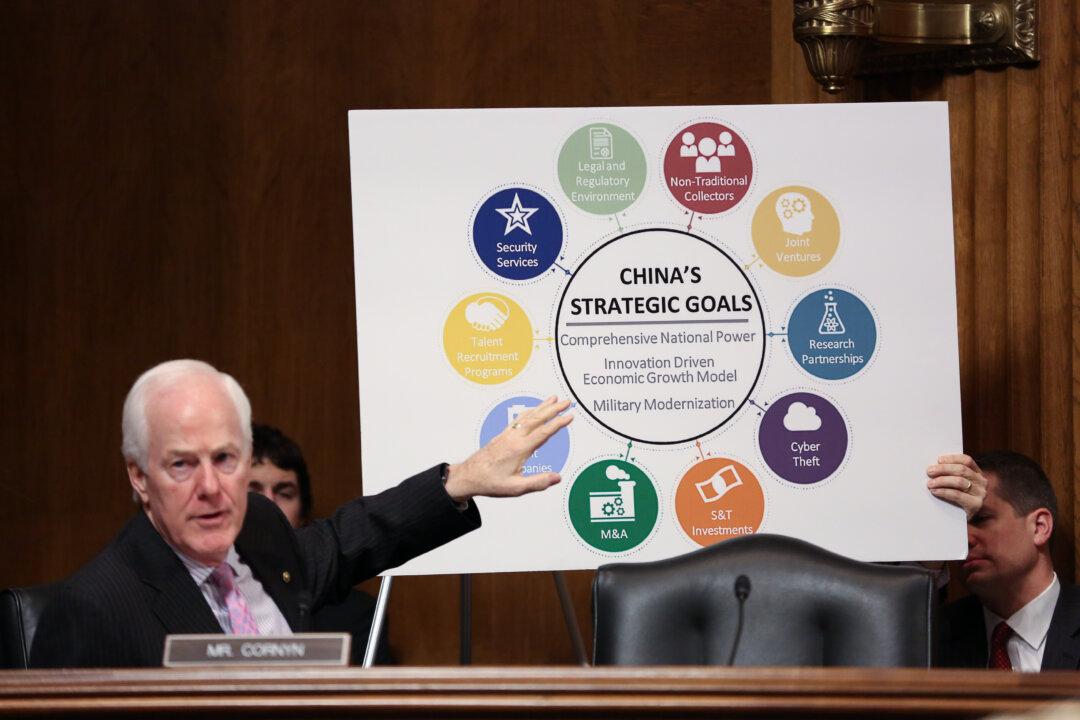Authored by Alex Joske and published on June 9, the report states that the CCP’s united front system reaches beyond China’s borders into foreign countries in a complex web of efforts, often covert, to strengthen its influence among ethnic minority groups, religious movements, and business, science, and political groups.
The problem, according to the report, is that experts, politicians, and security agencies don’t fully comprehend the extent to which the CCP’s united front work operates, both covertly and out in the open, because there is “little public analysis of the united front system.”
“Diplomats might see united front work as ‘public diplomacy’ or ‘propaganda’ but fail to appreciate the extent of related covert activities. Security officials may be alert to criminal activity or espionage while underestimating the significance of open activities that facilitate it,” Joske wrote in the report.
The covert and overt facets of the CCP’s influence are interrelated, and Joske wrote that analysts risk overlooking this.
Victorian Government Staffer with United Front Ties
In Victoria, the state’s premier recently defended a staffer after her links to the CCP’s United Front Work Department (UFWD) were revealed.During a heated exchange during Question Time in Parliament on June 3, Opposition Leader Michael O'Brien asked Premier Daniel Andrews whether electorate officer Nancy Yang had been vetted by security agencies before she was hired.
The premier replied, “Speaker, I reject the assertion from Leader of the Opposition that Australian citizens ought to be vetted by security agencies.”
Yang wrote a comment with the post that read: “U.S. owe an explanation.”
Scrutiny of Yang came after revelations a Chinese-backed lobby group promoting Beijing’s Belt and Road Initiative (BRI) received funding from the Victorian state government.
Australia Needs ‘Home Grown’ China Analysts
Australia and other countries need to cultivate homegrown expertise on the CCP and its united front system of foreign interference methods.Graham wrote: “The CCP calls the shots in China, internally and externally. Unless we understand the Party’s objectives, how its leaders think and make decisions, our policies are likely to come up short. Australia must develop the intellectual acumen to see the world through China’s leaders’ eyes to manage the relationship on its own terms.”
While the Chinese language is widely taught in Australia, including through the United Front Departments’ Confucius Institutes, Graham argues that China studies is not structured in a way to develop expertise on the CCP or the People’s Liberation Army. He argues that this would be helpful, much like understanding communism was during the Cold War.
The CCP’s United Front Targets
According to the ASPI’s report, the CCP targets 12 broad groups, including ethnic minorities, religious individuals, urban professionals, overseas and returned overseas students, people in Hong Kong and Macau, Taiwanese people and their relatives in mainland China, overseas ethnic Chinese and their relatives in mainland China, and any other individuals who need uniting and liaising, and more.The CCP seeks to integrate individuals or groups from these broad groups into the united front system. Not content with subverting just them, the CCP then uses them to co-opt or influence others.
In this way, the efforts of the united front work reduce foreign resistance to the CCP’s encroachment on a country’s sovereignty. The report states this involves covert activity and is a form of interference.
The report states: “Work on the targeted groups is designed to bring them under the party’s leadership not merely to neutralise any opposition they may pose, but also to have them serve as platforms for further efforts.”
The report used former Labor politician Sam Dastyari as an example in a case study on Huang Xiangmo, who donated over $3 million dollars to both major Australian parties and even stepped in once to pay a legal bill for Dastyari, who was by then a senator.
The report writes: “Dastyari was known as a prolific fundraiser, and his relationship with and patronage from Huang Xiangmo led to the downfall of both. As Dastyari later said: ‘There is an arms race for donations between the parties. And when you’ve got individuals like Huang who are prepared to fork out millions of dollars they get listened to.’”
Of Huang’s case study, the ASPI report stated: “It seems politicians treated Huang Xiangmo as a wealthy Chinese community leader and didn’t think too much about the political objectives contained in the very name of the reunification council he ran.”
The solution to the problem of subverted united front figures, according to the report, is for governments to disrupt their capacity to act as “vehicles of covert influence and technology transfer.”
The report noted that foreign interference often takes place in grey areas that are difficult to enforce by law. “Strengthening civil society and media must be a fundamental part of protecting against interference,” Joske wrote.
Among the recommendations, the report suggests the government study and develop its capacity to understand united front work, develop high-level policy on countering foreign interference, raise awareness about the matter, ensure legislation and political will exist to build transparency, protect those who expose interference, engage with universities to develop responses to related issues, support the Chinese diaspora (including grants for independent Chinese-language media), build expertise on China; the Chinese people; and the CCP, and deny visas or expel foreign agents.





